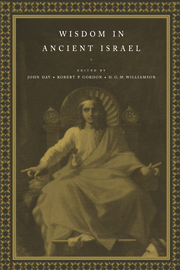Book contents
- Frontmatter
- Contents
- List of abbreviations
- Introduction
- Part 1 The ancient near eastern setting
- Part 2 Old Testament and Apocryphal texts
- 4 Foreign Semitic influence on the wisdom of Israel and its appropriation in the book of Proverbs
- 5 The limits of theodicy as a theme of the book of Job
- 6 Qoheleth
- 7 A house divided: wisdom in Old Testament narrative traditions
- 8 Wisdom in Solomonic historiography
- 9 Amos and wisdom
- 10 Hosea and the wisdom tradition: dependence and independence
- 11 Isaiah and the wise
- 12 Jeremiah and the wise
- 13 The wisdom psalms
- 14 Wisdom and Daniel
- 15 Ecclesiasticus: a tract for the times
- 16 The Christian use and the Jewish origins of the Wisdom of Solomon
- Part 3 Themes
- Biographical note: John Adney Emerton
- Bibliography of the works of John Adney Emerton
- Indexes
- Principal biblical and apocryphal references
4 - Foreign Semitic influence on the wisdom of Israel and its appropriation in the book of Proverbs
Published online by Cambridge University Press: 16 October 2009
- Frontmatter
- Contents
- List of abbreviations
- Introduction
- Part 1 The ancient near eastern setting
- Part 2 Old Testament and Apocryphal texts
- 4 Foreign Semitic influence on the wisdom of Israel and its appropriation in the book of Proverbs
- 5 The limits of theodicy as a theme of the book of Job
- 6 Qoheleth
- 7 A house divided: wisdom in Old Testament narrative traditions
- 8 Wisdom in Solomonic historiography
- 9 Amos and wisdom
- 10 Hosea and the wisdom tradition: dependence and independence
- 11 Isaiah and the wise
- 12 Jeremiah and the wise
- 13 The wisdom psalms
- 14 Wisdom and Daniel
- 15 Ecclesiasticus: a tract for the times
- 16 The Christian use and the Jewish origins of the Wisdom of Solomon
- Part 3 Themes
- Biographical note: John Adney Emerton
- Bibliography of the works of John Adney Emerton
- Indexes
- Principal biblical and apocryphal references
Summary
Semitic influence on the wisdom of Israel generally
Ever since the discovery that the Egyptian Instruction of Amenemope has remarkable parallels with Prov. xxii 17–xxiii 11, as well as other parts of Proverbs, the kinship of Israel's wisdom with that of the ancient near east has been recognized. Interestingly, the Old Testament itself recognizes that the Egyptians were noted for their wisdom and that this was not something confined to Israel. ‘Solomon's wisdom’, we read, ‘surpassed the wisdom of all the people of the east, and all the wisdom of Egypt’ (1 Kings v 10 [iv 30]). In the light of the kinship of Israel's wisdom with that of Egypt already noted, this verse would lead one to suspect that Israel was also dependent on the wisdom of the people of the east, i.e. the Semitic people who inhabited Transjordan. Explicit acknowledgement of something like this is frankly given in Prov. xxx 1 and xxxi 1, which claim to be imparting respectively ‘The words of Agur son of Jakeh of Massa’ and ‘The words of Lemuel, king of Massa, which his mother taught him’, Massa being in north-west Arabia (Gen. xxv 14; 1 Chron. i 30). Contrast the way in which Proverbs quietly appropriates the Egyptian wisdom of Amenemope without acknowledgement. However, unlike the wealth of attention bestowed on Israel's indebtedness to Egyptian wisdom, less attention has been paid to Israel's dependence on Semitic wisdom. Admittedly our sources of information on this subject are much more limited, but it is worth assessing what evidence we have.
- Type
- Chapter
- Information
- Wisdom in Ancient Israel , pp. 55 - 70Publisher: Cambridge University PressPrint publication year: 1995
- 5
- Cited by

